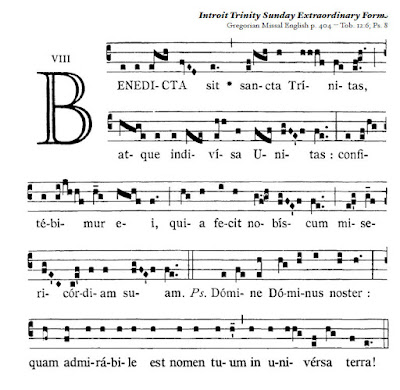Here's Giovanni Vianini's version of this Introit:
Here's the score from JoguesChant, with their translation below (with text derived from Tobit 12:6 and Psalm 8):
Here's the complete list of the current (and historical) chant propers for Trinity Sunday:
Hmmm. I think they're trying to tell us something. The Tobit theme ("Blessed be God, for for he has dealt with us according to his mercy") appears in the Introit, the Offertory, and the Communio; the Gradual and Alleluia, taken from Daniel 3, contain another common theme: "Blessed are you, O Lord, who gaze into the depths and who are enthroned upon the Cherubim. Blessed are you, O Lord, in the firmament of heaven, and worthy of praise for ever."
In fact, the long form of the Gradual is much more extensive:
This comes from the same text that makes up the "Canticle of the Three Young Men," the Benedicite Omnia Opera; the three young men in question are Shadrach, Meshach, and Abednego, who in the Daniel passage sing this hymn of praise to God while inside the fiery furnace:
Here's G. Vianini singing about half of this chant, which he calls a "Gregorian hymn for Holy Trinity":
Here's something nice! A Finnish singer, Pia Skibdahl, and her rendition of Hildegard von Bingen's "Benedictus es, Domine":
Here's the blurb from the YouTube page:
Here's (the 12-year-old!) Mozart's version of the day's Offertory, Benedictus Sit:
Here's Lorenzo Perosi's version of the same text, this time sung as the Offertory at worship (not sure where) on Advent 3:
See more about Trinity Sunday (and the Trinity) here, including some Te Deum stuff.
Here's the score from JoguesChant, with their translation below (with text derived from Tobit 12:6 and Psalm 8):
Blessed be the Holy Trinity and its undivided Unity; we shall ever give him thanks, for he has dealt with us according to his mercy. O Lord, our Governor, how admirable is your name in all the earth!
Here's the complete list of the current (and historical) chant propers for Trinity Sunday:
Introit: Benedicta Sit
Gradual: Benedictus Es
Alleluia: Benedictus Es
Offertory: Benedictus Sit
Communion: Benedicimus Deum
Hmmm. I think they're trying to tell us something. The Tobit theme ("Blessed be God, for for he has dealt with us according to his mercy") appears in the Introit, the Offertory, and the Communio; the Gradual and Alleluia, taken from Daniel 3, contain another common theme: "Blessed are you, O Lord, who gaze into the depths and who are enthroned upon the Cherubim. Blessed are you, O Lord, in the firmament of heaven, and worthy of praise for ever."
In fact, the long form of the Gradual is much more extensive:
Blessed are you, O Lord, the God of our fathers. And worthy to be praised and glorified for ever. And blessed is your glorious, holy name. And worthy to be praised and glorified for ever. Blessed are you in the holy temple of your glory. And worthy to be praised and glorified for ever. Blessed are you upon the sacred throne of your kingdom. And worthy to be praised and glorified for ever. Blessed are you through the mighty sceptre of your divinity. And worthy to be praised and glorified for ever. Blessed are you as you gaze into the depths, enthroned upon the Cherubim. And worthy to be praised and glorified for ever. Blessed are you as you tread upon the wings of the wind, and on the waves of the sea. And worthy to be praised and glorified for ever. Let all your Angels and Saints bless you. And praise you and glorify you for ever. Let the heavens, the earth, the sea, and all the things that dwell therein, bless you. And praise you and glorify you for ever. Glory be to the Father, and to the Son, and to the Holy Spirit. Who is worthy to be praised and glorified for ever. As it was in the beginning, is now, and ever shall be, world without end. Amen. And worthy to be praised and glorified for ever. Blessed are you, O Lord, the God of our fathers. And worthy to be praised and glorified for ever.
This comes from the same text that makes up the "Canticle of the Three Young Men," the Benedicite Omnia Opera; the three young men in question are Shadrach, Meshach, and Abednego, who in the Daniel passage sing this hymn of praise to God while inside the fiery furnace:
[This is a] Canticle from the Apocryphal book, Song of the Three Young Men, verses 35-65. It is also known as the "Benedicite." It appears as Canticles 1 and 12 in the BCP (pp. 47-49, 88-90) and has been used at the morning office since the fourth century. The Benedicite is a continuation of the canticle Benedictus es, Domine (Canticles 2 and 13). The Benedicite and the Benedictus es, Domine form an extended paraphrase of Ps 148. The Benedicite begins with the invocation, "Glorify the Lord, all you works of the Lord," and concludes with a doxology. It summons all the cosmic order, the earth and its creatures, and all the living and departed people of God to "bless ye the Lord."
Here's G. Vianini singing about half of this chant, which he calls a "Gregorian hymn for Holy Trinity":
Here's something nice! A Finnish singer, Pia Skibdahl, and her rendition of Hildegard von Bingen's "Benedictus es, Domine":
Here's the blurb from the YouTube page:
Laulaja/singer Pia Skibdahl
Alleluia!
Benedictus es Domine
Deus patrum nostrorum
et laudabilis in saecula.
Alleluia!
Blessed is the Lord
the God of our ancestors
and praised for ever.
Hallelujaa
Siunattu on Herra
isiemme Jumala
ja ylistetty iankaikkisesti!
Here's (the 12-year-old!) Mozart's version of the day's Offertory, Benedictus Sit:
Here's Lorenzo Perosi's version of the same text, this time sung as the Offertory at worship (not sure where) on Advent 3:
See more about Trinity Sunday (and the Trinity) here, including some Te Deum stuff.






0 comments:
Post a Comment